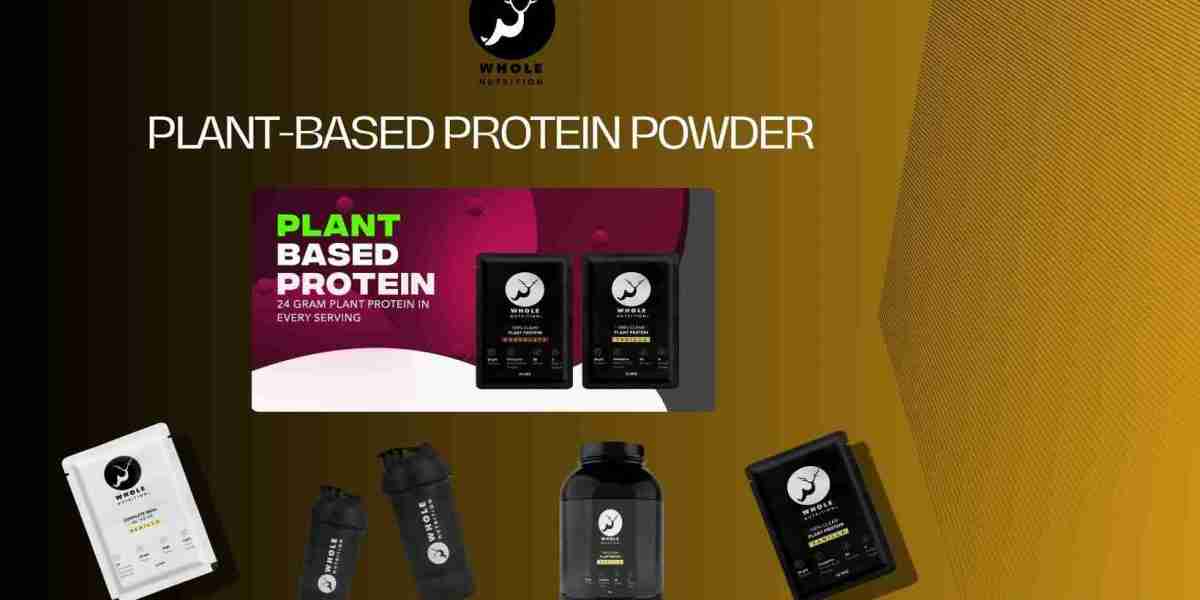Introduction:
In today's health-conscious world, more and more people are turning to plant-based diets for their numerous benefits, including improved health, ethical considerations, and environmental sustainability. One of the essential components of any diet, especially for those engaged in fitness and muscle building, is protein. Enter plant-based protein powders, which are gaining popularity as a convenient and effective way to ensure adequate protein intake. This blog will explore the benefits, types, and best practices for using plant-based protein powders, specifically vegan protein powders, to enhance your health and fitness journey.
Why Choose Plant-Based Protein Powder?
Health Benefits:
Plant-based protein powders are rich in essential nutrients and provide several health benefits:
Improved Digestion: Plant proteins are generally easier to digest than animal proteins, reducing the risk of gastrointestinal discomfort.
Nutrient-Dense: Many plant-based protein powders come packed with vitamins, minerals, and antioxidants, contributing to overall health and wellness.
Heart Health: Plant proteins tend to be lower in saturated fats and cholesterol compared to animal proteins, promoting better cardiovascular health.
Ethical and Environmental Benefits:
Choosing plant-based protein powder supports a more sustainable and ethical food system:
Animal Welfare: By opting for vegan protein powders, you help reduce the demand for animal products and the associated ethical concerns.
Lower Environmental Impact: Plant-based protein production generally requires fewer resources and generates less greenhouse gas emissions than animal protein production, making it a more environmentally friendly choice.
Types of Plant-Based Protein Powders:
Pea Protein:
Source: Derived from yellow peas.
Benefits: Rich in essential amino acids, particularly branched-chain amino acids (BCAAs), vital for muscle growth and recovery.
Taste and Texture: Smooth texture and mild taste, making it a versatile addition to smoothies and recipes.
Hemp Protein:
Source: Extracted from hemp seeds.
Benefits: Complete protein source with all nine essential amino acids, plus omega-3 and omega-6 fatty acids for anti-inflammatory benefits.
Taste and Texture: Earthy flavor and slightly gritty texture, often used in shakes and baked goods.
Brown Rice Protein:
Source: Made from sprouted brown rice.
Benefits: Hypoallergenic and easily digestible, suitable for those with food sensitivities.
Taste and Texture: Neutral taste and fine texture, easily blended into various dishes.
Soy Protein:
Source: Derived from soybeans.
Benefits: Complete protein source with a high bioavailability, supporting muscle repair and growth.
Taste and Texture: Mild flavor and smooth texture, ideal for a variety of culinary uses.
Pumpkin Seed Protein:
Source: Extracted from pumpkin seeds.
Benefits: Rich in magnesium, zinc, and healthy fats, along with good protein content.
Taste and Texture: Nutty flavor and fine texture, perfect for adding to smoothies and baked goods.
Incorporating Vegan Protein Powder into Your Diet:
Post-Workout Recovery:
After a strenuous workout, your muscles need protein to repair and grow. Mixing vegan protein powder with water, or plant-based milk, or blending it into a smoothie provides a quick and efficient post-workout recovery drink.
Meal Replacement Shakes:
For those busy days when you need a nutritious meal on the go, a protein-packed shake can be an excellent meal replacement. Combine vegan protein powder with fruits, vegetables, nuts, and seeds for a balanced and satisfying shake.
Boosting Protein in Recipes:
Vegan protein powders can be easily incorporated into various recipes to boost their protein content. Add them to your morning oatmeal, pancake batter, energy bars, or even soups and sauces.
Baking:
Enhance the nutritional profile of your baked goods by adding vegan protein powder to muffins, cookies, bread, and cakes. It’s an easy way to ensure you’re getting enough protein while enjoying your favorite treats.
Choosing the Right Vegan Protein Powder:
When selecting a vegan protein powder, consider the following factors:
Ingredients: Look for products with minimal and clean ingredients. Avoid those with artificial sweeteners, flavors, and additives.
Protein Content: Check the protein content per serving to ensure it meets your dietary needs.
Flavor and Texture: Choose a flavor you enjoy and a texture that blends well with your preferred uses.
Allergen-Free: If you have food allergies or sensitivities, opt for hypoallergenic options like peas or brown rice.
Conclusion:
Incorporating plant-based protein powders into your diet is a convenient and effective way to meet your protein needs while supporting a healthy, ethical, and environmentally friendly lifestyle. Whether you’re an athlete, a fitness enthusiast, or simply someone looking to improve their nutrition, vegan protein powders offer a versatile solution to enhance your diet. At Whole Nutrition, we offer a range of high-quality vegan protein powders to suit your needs. Visit our website to explore our products and take the next step in your health journey. Discover the power of plant-based protein today!








